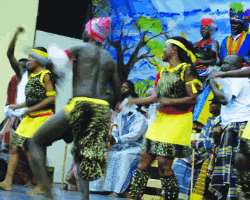THE CONTEST: WHEN ENEMIES FALL IN LOVE

Artists on stage
Like the proverbial race of life that involves intense struggle, The Contest, a play written and directed by Mike Anyanwu, is both didactic and symbolic. Staged by the National Troupe of Nigeria as a Yuletide offer to holiday-makers, the play was a timely menu for Nigerians in view of the 2011 general polls.
Set in the riverine Niger Delta, the play explores the love story between Amatu (Virginia Okereku) and Achibong (Matthew Gyang) to unveil a clog in the wheel of socio-political and economic advancement in Africa. For quite sometime, Owameland and Efut (where the lovers hail from respectively) had nursed communal conflict over a disputed peninsular forcing the two lovers to meet only secretly. The flame of their youthful love can hardly glow since their communities have remained sworn enemies.
With the coming of the Holy Week in Owame, Amatu becomes the choice of the gods and the natural bride of whoever wins the traditional wresling contest in the land. But worried by the fear of losing his lover to some strange wrestler, Achibong challenges the winner of the contest, thus desecrating the Holy Week and making it inconclusive.
Meanwhile, Amatu falls ill while Oruene(Anne Njemanze), the priestess, is appointed to look after her. After some time within which Owane land is troubled, the royal father, Amayanabo (Albert Akaeze) gets jittery and challenges his kingdom for a solution. Some of the chiefs opt for war while others embrace peace, offering to obey the oracle which prescribes laughters rather than blood.
As the search for solution continues, Achibong disguises as a herbalist and visits Amatu in her sick bed. Oruene allows him on condition that he heals her. Achibong succeeds in reviving Amatu and warns that Owame can only know peace if the challenge at the wrestling contest is upheld. This forces Oruene to confess to the kingdom the love between Amatu and Achibong and the fear that an attempt to stop the lovers may spell doom for the commuinty.
Apparently intrigued by the herbalist's warning, Amayanabo sends emissaries to the Obong in Efut (Kayode Idris), asking for the challenger to come for the contest. And in a share show of honour and pride, Obong convinces the chiefs to allow his son and heir, Achibong, to honour the Owame invitation. The main contest expectedly favours Achibong and the two communities jubilate as Amatu is eventually handed over to her heartrob. The union instantly brings truce while the two royal fathers agree to sheathe their swords. In the end, love triumphs and the incessant calls for war defeated.
A well-written story that resolves a political conflict through an amorous affair, The Contest, indeed is a parable for African leadership class whose territories are replete with wars and communal clashes. Rather than resort to bloodletting, the playwright advocates peace, using dialogue, love and mutual understanding as viable alternatives.
As a total theatre experience, the play merges aeathetic and functional elements, showcasing the beauty and heterogeneity of African tradition in rich custumes, music, drumming and dancing.
The open display of masquerades, charm, proverbial language, weaponry, symbols and royal paraphenalia also demonstrate the diversity and potency of African values. In the same vein, Anyanwu as director thrills the audience repeatedly with humour during the wrestling contest, using hilarious characters as major contenders. The contest itself is made real by the wrestlers who end up entertaining the audience with their wits. Two of these wrestlers represent the Igbo and the Yoruba, with a subtle lesson that share reliance on pride and arrogance, rather than skill, usually lead to failure.
Although the play had challenges in the areas of limited lighting and raised set, particularly during the media viewing, it has since matured in pace and quality during subsequent stagings. In fact, the Cinema Hall 2 venue of the production received thousands of theatre lovers, many of who came to savour the play with their families. Some members of the audience even suggested that the play should be moved round the entire country as a way of drumming up support for peaceful resolution of conflicts, rather than using violence lesson that share reliance on pride and arrogance, rather than skill, usually lead to failure.
Although the play had challenges in the areas of limited lighting and raised set, particularly during the media viewing, it has since matured in pace and quality during subsequent stagings. In fact, the Cinema Hall 2 venue of the production received thousands of theatre lovers, many of who came to savour the play with their families. Some members of the audience even suggested that the play should be moved round the entire country as a way of drumming up support for peaceful resolution of conflicts, rather than using violence.
